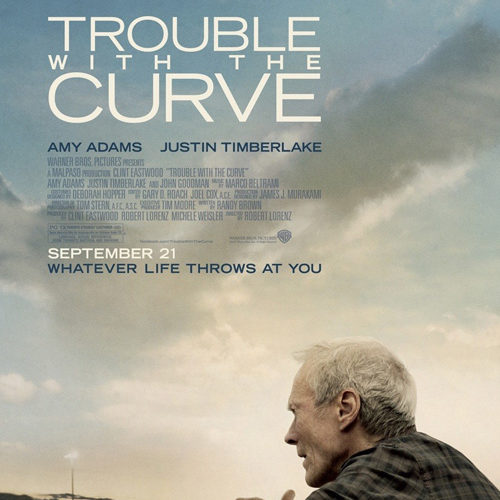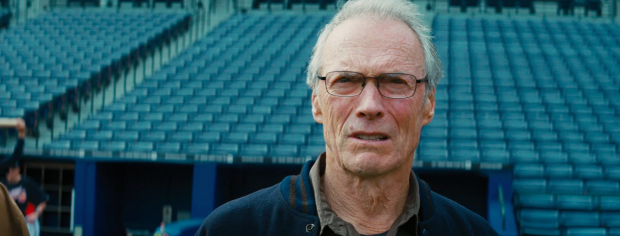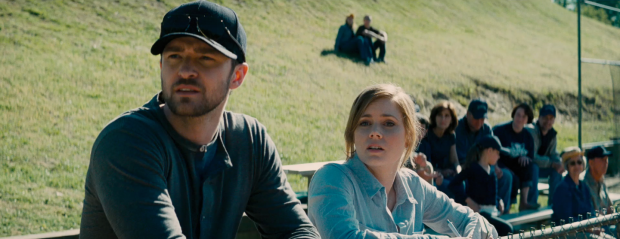Say what you want about Clint Eastwood‘s recent output, but the simple fact that it includes films as widely disparate as Million Dollar Baby, Gran Torino, Hereafter, and J. Edgar proves that the screen-legend veteran has no fear or trepidation with regards to exploring uncharted territory. It’s with great disappointment, then, that I report that the debut feature of Robert Lorenz — who produced all of the aforementioned Eastwood pictures, and has assistant-directed on several others — is an exercise devoted to bland conventionality.
Trouble with the Curve is based on an original screenplay by first-time writer Randy Brown, and the uniformly conservative nature of Lorenz‘s camera suggests that he might have had too strong an affinity for the safe, sheltered simplicity of Brown‘s work. The kinks begin with the characterization of Gus Lobel (Eastwood), who’s not a plausible human being as much as he is an ill-advised attempt at recreating the combination of latent sensitivity and classic, Eastwood-style growling that, for my money, worked so well in Gran Torino.
For example, we’re told, via a moment of in-conversation exposition from Gus’s co-worker and longtime friend, Pete Klein (John Goodman), that Gus is one of the best scouts the game of baseball has ever seen. But then we get a sequence where Gus is watching a game, and the image gets all blurry — he obviously can’t see anything from where he’s sitting, and yet his reaction is to continue small-talking with old-timer friends as opposed to doing something about his affliction. Days go by, and multiple people, including his own personal doctor, say that he should seek out an intensive eye exam, but Gus refuses. This is an illustration of something that feels more like a writer’s device than it does an authentic representation of old-age stubbornness — and I didn’t even mention the fact that, with only months left on his contract, the movie depicts the precise timeline during which Gus would be most tempted to be in the best possible shape of his career.
The film offsets Gus’s tenacious cynicism with the sweetness of his daughter, Mickey (Amy Adams, as appealingly cuddly as she is the opposite in The Master). Mickey is a rising employee in a powerful Atlanta law-firm, and it’s no surprise that such a career has led her to become slightly estranged from her typically thick-skinned father. But she’s convinced, both through Pete’s friendly suggestion and her own feminine intuition, that Gus needs some company on his upcoming road-trip, and she therefore surprises him by showing up out of nowhere to help him gauge the potential of a hot young prospect named Bo Gentry (Joe Massingill).
Gentry has many other scouts on his tail, though, and it turns out that one of them, Johnny Flanagan (Justin Timberlake), was a former pitcher endorsed by none other than Gus himself. The two of them get up to speed, Johnny catches Mickey’s eye, and the possibilities for a love-filled happy-ending start sprouting in all directions. My instinct told me that Timberlake‘s contribution would feel awkward, but I turned out to be wrong — his scenes with Adams are some of the film’s most easygoing pleasures, and, aside from an introductory beat that lays on the broadcaster aspirations a little too cutely, he brings a comfortably relaxed presence to the film.
As hinted at earlier, it’s rather Eastwood‘s own dimension of the film that has a creaky vibe to it, as if Lorenz told Brown to write in Gus’s role at the last minute just so he could direct his long-standing mentor in his first directorial effort. The problem is not Eastwood‘s acting, but the severe tonal inconsistencies of the situations he’s thrust into. One uncomfortable scene shows Gus singing “You Are My Sunshine” to the grave of his deceased wife — an overt, though somewhat moving, touch — only to paralyze the moment’s entire effect by immediately inserting Carly Simon’s version of the same song into the soundtrack.
There’s the issue, too, of the film’s antagonists. The true villains, of course, are the demons that haunt the father-daughter relationship — and we sense there’s an explanation to be found in the otherwise out-of-place opening shot of a horse galloping towards the viewer — but the movie’s more concrete conflict instead centers around the participation of two lazily drawn youngsters. One is Bo, who’s a talented hitter, but also an egotistical, overt womanizer. The other is Matthew Lillard‘s Phillip Sanderson, another Atlanta Braves scout who earns Gus’s eternal hatred by embracing computers as an integral aspect of the scouting profession. These two characters are partial fun when their respective vices are on display, but when we’re meant to witness their behavior in the midst of a climax that’s supposed to generate emotion, it’s tougher to remain on the film’s sappy wavelength.
Also a drawback is that the film exhibits no working knowledge of the sport it represents — if you found last year’s Moneyball to dumbed-down, which it wasn’t by any means, then Trouble with the Curve will feel like an online class recommended for kids between the ages of three and five. It’s the kind of movie that uses lines like “the next Albert Pujols” to describe Bo’s potential, or “Gus could spot talent from an airplane” to inform us of the character’s scouting prowess. And even though the film isn’t trying to be anything that it’s not, it is trying very hard to tug at your heartstrings, and you can’t mix emotional epiphanies with comatose storytelling and expect to generate a film of emotional epiphanies.
Trouble with the Curve hits theaters on Friday, September 21st.



